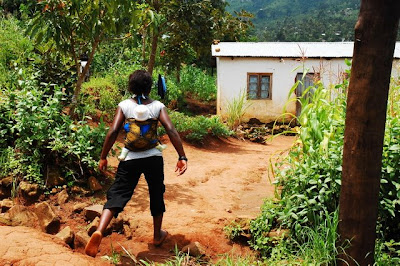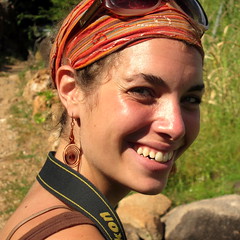Monday, February 22, 2010
HOW TO: Drink (and Brew) Beer Like a Malawian (Glimpse)
My how-to piece on Chibuku has gone up on the Glimpse website. Check it out here.
Friday, February 12, 2010
Pointing at Difference and Finding Inclusion (Glimpse)
The four young women and I hop from rock to rock, avoiding the sewage that carves dirty channels in the dusty ground. Our narrow path cuts under mango and banana trees and behind mud-and-brick houses, through those in-between spaces where young siblings bathe even younger ones and their mothers chop leafy greens for lunch. Overgrown, startlingly emerald bushes brush against my legs and make this neighborhood seem more lush jungle than urban township.
The women and I make mostly futile attempts at conversation. My Chichewa continues to muddle along, and the women all left school before attaining any kind of English proficiency. I settle for silence, happy to listen to their lively banter and imagine the subject of conversation. Their families? Price increases at the produce market? Local gossip?
We are five women walking together, but we actually number nine. Aside from me, each woman has a baby on her back, an infant swaddled in a strip of colorful fabric. Modesta and Debra, Patuma and Siffa, Mphatso and George, Delia and Fanny. I carry only a backpack. We are all close in age, even in height, yet I am conspicuously the non-mother, the township outsider, the white foreigner.

Our walk takes us to numerous doorsteps, where the women call out the name of a friend. “Laina!” they holler. “Laina! Laina!” Laina promises to meet us later. We can’t find Esther.
At one point I swivel around, checking that I haven’t walked too far ahead of the others. In the doorframe of a tin-roofed house leans a girl, a girl with pale skin and light hair. She gives me a surprised smile.
I turn to the women. “Ndinaona mzungu!” I screech. “I saw a white person!”
The women erupt. They laugh and slap my back and exchange high fives. They give me expressions of incredulity, as if I have somehow forgotten my own skin color. “I know, I know,” I explain in Chichewa. “I know I’m white, but I saw another white person!” I don’t know how to say “another” in Chichewa. Whatever. “Ndinaona another mzungu!” I cry.
The path has widened here, and we walk five abreast. I have somehow ended up in the middle of the chain, no longer several steps ahead of the other women. Their peals of laughter continue, and one of the women grips and shakes my hand. I laugh as well, feeling more included than I have all day, but well aware that this moment of inclusion has come at the hands of a frustratingly superficial but nevertheless unshakeable difference.
The women and I make mostly futile attempts at conversation. My Chichewa continues to muddle along, and the women all left school before attaining any kind of English proficiency. I settle for silence, happy to listen to their lively banter and imagine the subject of conversation. Their families? Price increases at the produce market? Local gossip?
We are five women walking together, but we actually number nine. Aside from me, each woman has a baby on her back, an infant swaddled in a strip of colorful fabric. Modesta and Debra, Patuma and Siffa, Mphatso and George, Delia and Fanny. I carry only a backpack. We are all close in age, even in height, yet I am conspicuously the non-mother, the township outsider, the white foreigner.
Our walk takes us to numerous doorsteps, where the women call out the name of a friend. “Laina!” they holler. “Laina! Laina!” Laina promises to meet us later. We can’t find Esther.
At one point I swivel around, checking that I haven’t walked too far ahead of the others. In the doorframe of a tin-roofed house leans a girl, a girl with pale skin and light hair. She gives me a surprised smile.
I turn to the women. “Ndinaona mzungu!” I screech. “I saw a white person!”
The women erupt. They laugh and slap my back and exchange high fives. They give me expressions of incredulity, as if I have somehow forgotten my own skin color. “I know, I know,” I explain in Chichewa. “I know I’m white, but I saw another white person!” I don’t know how to say “another” in Chichewa. Whatever. “Ndinaona another mzungu!” I cry.
The path has widened here, and we walk five abreast. I have somehow ended up in the middle of the chain, no longer several steps ahead of the other women. Their peals of laughter continue, and one of the women grips and shakes my hand. I laugh as well, feeling more included than I have all day, but well aware that this moment of inclusion has come at the hands of a frustratingly superficial but nevertheless unshakeable difference.
Subscribe to:
Posts (Atom)



